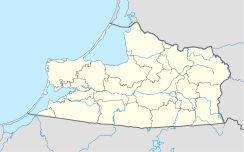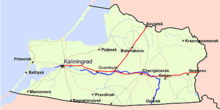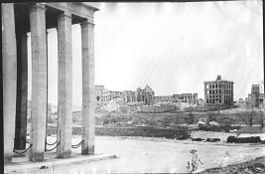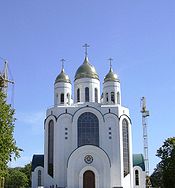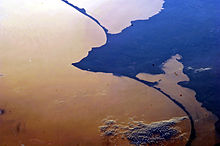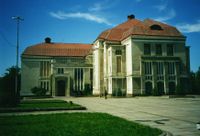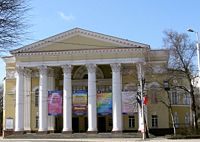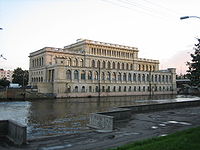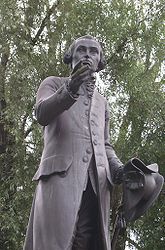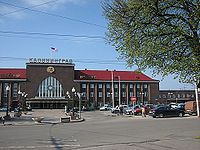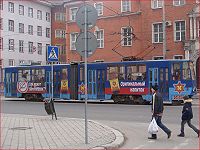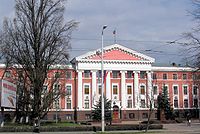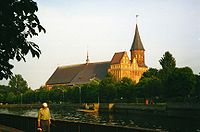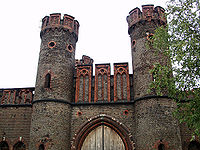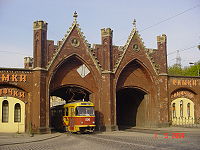- Kaliningrad
-
This article is about the administrative center of Kaliningrad Oblast, Russia. For other uses, see Kaliningrad (disambiguation).
Kaliningrad (English)
Калининград (Russian)- City[citation needed] - 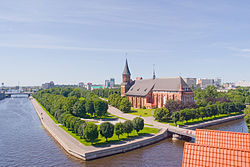
Old Königsberg amid the modern Kaliningrad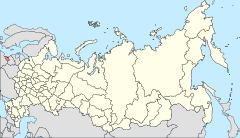
Location of Kaliningrad Oblast in RussiaCoordinates: 54°43′N 20°31′E / 54.717°N 20.517°ECoordinates: 54°43′N 20°31′E / 54.717°N 20.517°E Coat of arms Flag City Day July 4; observed on the first Saturday of July[citation needed] Administrative status Country Russia Federal subject Kaliningrad Oblast Administrative center of Kaliningrad Oblast[citation needed] Municipal status Urban okrug Kaliningrad Urban Okrug[citation needed] Head[citation needed] Alexander Yaroshuk[citation needed] Representative body City Council of Deputies[citation needed] Statistics Area 215.7 km2 (83.3 sq mi)[citation needed] Population (2010 Census,
preliminary)431,491 inhabitants[1] - Rank in 2010 40th Population (2002 Census) 430,003 inhabitants[2] - Rank in 2002 42nd Density 2,000 /km2 (5,200 /sq mi)[3] Time zone USZ1 (UTC+03:00)[4] Founded 1255[citation needed] Postal code(s) 236000[citation needed] Dialing code(s) +7 4012[citation needed] Official website Kaliningrad (Russian: Калинингра́д; Polish: Królewiec; Lithuanian: Karaliaučius; German: Königsberg) is a seaport and the administrative center of Kaliningrad Oblast, the Russian exclave between Poland and Lithuania on the Baltic Sea. The territory, the northern part of the former East Prussia, borders on NATO and EU members Poland and Lithuania, and is geographically separated from the rest of Russia.
Originally named Königsberg in German, the town was founded in 1255 and was part of Prussia and then of Germany until 1945, but was largely destroyed during World War II. Its ruins were occupied by the Red Army in 1945 and its German population forced out. It was renamed Kaliningrad in 1946 in honor of Mikhail Kalinin.
According to the preliminary results of the 2010 Census, its population was 431,491[1]—an increase from 430,003 recorded in the 2002 Census.[2] Its ethnic composition is 77.9% Russians, 8.0% Belarusians, 7.3% Ukrainians, 1.9% Lithuanians,[5] 0.6% Germans, and 0.5% Poles.[6]
Contents
History
Königsberg
The site now occupied by Kaliningrad was previously the site of the German city of Königsberg, founded in 1255. During World War II the city was largely destroyed.
Soviet Union
At the end of World War II in 1945, the city became part of the Soviet Union pending the final determination of territorial questions at the peace settlement (as part of the Russian SFSR) as agreed upon by the Allies at the Potsdam Conference:
VI. CITY OF KÖNIGSBERG AND THE ADJACENT AREA
The Conference examined a proposal by the Soviet Government that pending the final determination of territorial questions at the peace settlement the section of the western frontier of the Union of Soviet Socialist Republics which is adjacent to the Baltic Sea should pass from a point on the eastern shore of the Bay of Danzig to the east, north of Braunsberg and Goldap, to the meeting point of the frontiers of Lithuania, the Polish Republic and East Prussia. The Conference has agreed in principle to the proposal of the Soviet Government concerning the ultimate transfer to the Soviet Union of the city of Koenigsberg and the area adjacent to it as described above, subject to expert examination of the actual frontier. The President of the United States and the British Prime Minister have declared that they will support the proposal of the Conference at the forthcoming peace settlement.[7]Königsberg was renamed Kaliningrad in 1946 after the death of Chairman of the Presidium of the Supreme Soviet of the USSR Mikhail Kalinin, one of the original Bolsheviks. The German population was expelled and the city was repopulated with Soviet citizens. German was replaced by Russian as the language of everyday life. The city was rebuilt, and went through industrialisation and modernisation. As the westernmost territory of the USSR, the Kaliningrad Oblast became a strategically important area during the Cold War. The Soviet Baltic Fleet was headquartered in the city in the 1950s. Because of its strategic importance, Kaliningrad was closed to foreign visitors.
In 1957 an agreement was signed and later came into force which delimited the border between Poland and the Soviet Union.[8][9]
Russian Federation
Kaliningrad is the only Russian Baltic Sea port that is ice-free all year round and hence plays an important role in maintenance of the Baltic Fleet.
Due to the collapse of the Soviet Union in 1991, the Kaliningrad Oblast became an exclave, geographically separated from the rest of Russia. This isolation from the rest of Russia became even more pronounced politically when Poland and Lithuania became members of NATO and subsequently the European Union in 2004. All military and civilian land links between the region and the rest of Russia have to pass through members of NATO and the EU. Special travel arrangements for the territory's inhabitants have been made through the Facilitated Transit Document (FTD) and Facilitated Rail Transit Document (FRTD).[10][11]
Today, there is some debate about changing the name of the city back to "Königsberg" in the same way that several other Russian cities have reverted to their pre-Soviet names, e.g. Saint Petersburg and Tver, which were known in the Soviet era as Leningrad and Kalinin, respectively. "Kyonig" (Кёниг, a shortened form of "Königsberg" via Russian) is often used in advertisements for tourism companies in the region. Another possibility would be to give it a Russian name similar to other historic Slavic names, such as "Korolevets".[citation needed]
In July 2005, 750-year jubilee of city widely celebrated.
In July 2007, Russian First Deputy Prime Minister Sergei Ivanov declared that if US-controlled missile defense systems were deployed in Poland, then nuclear weapons might be deployed in Kaliningrad. On 5 November 2008, Russian leader Dimitry Medvedev said that installing missiles in Kaliningrad was almost a certainty.[12] These plans were suspended, however, in January 2009.[13]
Geography
Kaliningrad is located at the mouth of the navigable Pregolya River/Pregel River, which empties into the Vistula Lagoon, an inlet of the Baltic Sea.
Sea vessels can access Gdańsk Bay/Bay of Danzig and the Baltic Sea by way of the Vistula Lagoon and the Strait of Baltiysk.
Until around 1900 ships drawing more than 2 meters (6.6 ft) of water could not pass the bar and come into town, so that larger vessels had to anchor at Pillau (now Baltiysk), where merchandise was moved onto smaller vessels. In 1901 a ship canal between Königsberg and Pillau was completed at a cost of 13 million German marks which enabled vessels of a 6.5 meters (21 ft) draught to moor alongside the town. (See also Ports of the Baltic Sea.)
Khrabrovo Airport is located 24 kilometers (15 mi) north of Kaliningrad, and has a few scheduled and charter services to several destinations throughout Europe. There is the smaller Kaliningrad Devau Airport for general aviation. Kaliningrad is also home to Kaliningrad Chkalovsk naval air base.
City districts
As of 2011, the city is divided into three administrative districts:
City district Russian name Inhabitants
2010 Census (preliminary results)[1]Notes Moskovsky Московский 151,990 Named after the Russian capital, Moscow Leningradsky Ленинградский 159,764 named after Leningrad, now Saint Petersburg Tsentralny Центральный 119,737 lit. central, as it lies to the northwest of the historical city center Two administrative districts were abolished in June 2009:
City district Russian name Inhabitants
2002 Census[2]Notes Baltiysky Балтийский 68,664 named after the Baltic Sea Oktyabrsky Октябрьский 43,252 named after the October Revolution Climate
Climate data for Kaliningrad (1971 - 2000) Month Jan Feb Mar Apr May Jun Jul Aug Sep Oct Nov Dec Year Record high °C (°F) 12.7
(54.9)15.6
(60.1)23.0
(73.4)31.7
(89.1)30.6
(87.1)33.5
(92.3)36.3
(97.3)36.5
(97.7)31.2
(88.2)26.4
(79.5)19.4
(66.9)13.3
(55.9)36.5
(97.7)Average high °C (°F) 1.3
(34.3)2.3
(36.1)6.1
(43.0)11.6
(52.9)17.7
(63.9)20.4
(68.7)22.0
(71.6)22.1
(71.8)17.2
(63.0)11.9
(53.4)5.3
(41.5)2.4
(36.3)11.7 Average low °C (°F) −3.8
(25.2)−3.2
(26.2)−0.8
(30.6)2.7
(36.9)7.4
(45.3)10.6
(51.1)12.9
(55.2)12.8
(55.0)8.8
(47.8)5.1
(41.2)0.3
(32.5)−1.9
(28.6)4.2 Record low °C (°F) −32.5
(−26.5)−33.3
(−27.9)−21.7
(−7.1)−5.4
(22.3)−3.1
(26.4)0.7
(33.3)4.5
(40.1)1.6
(34.9)−2
(28.4)−11.2
(11.8)−18.7
(−1.7)−25.6
(−14.1)−33.3
(−27.9)Precipitation mm (inches) 57
(2.24)40
(1.57)43
(1.69)37
(1.46)53
(2.09)71
(2.8)80
(3.15)90
(3.54)89
(3.5)79
(3.11)91
(3.58)73
(2.87)803
(31.61)Source: Pogoda.ru.net[14] Cityscape
Museums
Kaliningrad has many museums. A few examples are the Immanuel Kant museum on the Kneiphof island, the Museum of History and Arts, which still has parts of the so-called Prussia collection of local archaeological findings, and the Kaliningrad Amber Museum, which is situated in the Dohna tower near the Rossgarten Gate. The city also has an art gallery with eight exhibition rooms.
The Museum of the World's Oceans is located on the former research vessel Wityaz on the shore of the Pregel river. The museum displays the newest technologies on sea research and also shows the diversity of the flora and fauna of the world's oceans. An anchored Foxtrot-class submarine next to the museum, the B-413, hosts an exhibit about the Russian submarine fleet.
Theater
The Kaliningrad Philharmonic Orchestra is accommodated in the former Catholic Church of the Holy Family of Königsberg, built in 1907. The church was destroyed during World War II, but rebuilt afterwards. The building, which has noted acoustics, functions as an organ hall since re-opening in 1980.
The city's theater is still located in the former Königsberg theater, which was opened in 1910. The building was rebuilt after the war using earlier plans for the theater and opened in 1960. The colonnade in front of the entrance was modeled after the Bolshoi Theater in Moscow.
The regionally notable Kaliningrad Puppet Theater has had its seat since 1975 in the Queen Louise Remembrance Church. This neo-romantic church, designed by architect Fritz Heitmann, was built in 1901.
Architecture
The pre-war city center (Altstadt and Kneiphof) currently consists of parks, broad avenues, a square on the site of the former Königsberg Castle, and only two buildings: the House of the Soviets ("Dom Sovyetov"), roughly on the site of the former Castle, and the restored Königsberg Cathedral on the Kneiphof island (now "Kant island"). Immanuel Kant's grave is situated next to the Cathedral. The new city centre is concentrated around Victory Square. The Cathedral of Christ the Savior, consecrated in 2005, is located on that square.
Also worth seeing are the former Stock Exchange, the surviving churches, and the remaining city gates. In anti-clockwise order these gates are: the Sackheim Gate (German: Sackheimer Tor), King's Gate (German: Königstor), Rossgarten Gate (German: Rossgärter Tor), Attack Gate (German: Ausfallstor), Railway Gate (German: Eisenbahntor), Brandenburg Gate (German: Brandenburger Tor), and Friedland Gate (German: Friedländer Tor). Apart from the already mentioned Dohna tower, which houses the Amber museum, the Wranger tower also remains as a reminder of the former Königsberg city walls. Only the gate of the former Friedrichsburg Castle remains.
Monuments
Notable monuments include the statue of Immanuel Kant in front of the Immanuel Kant State University of Russia. The statue was made by notable sculptor Christian Daniel Rauch and unveiled in 1864. The statue was destroyed in 1945, but was remoulded in 1992 on the initiative of Marion Dönhoff. Also worth seeing is the Cosmonaut monument, which honours the Kaliningrad cosmonauts Alexei Leonov, Yuri Romanenko and Aleksandr Viktorenko. Other statues and monuments include the statue for count Albrecht, the statue for Friedrich Schiller, the statue for Tsar Peter the Great, the "Mother Russia" monument, and the Monument for the 1200 Guardsmen, remembering the Battle of Königsberg.
Parks
The Kaliningrad Zoo was opened as the Königsberg Zoo in 1896. The collection, which extends over 16.5 ha, comprises 315 species with a total of 2264 individual animals (as of 2005). The Kaliningrad zoo is also an arboretum.
Lower Pond
Centrally located in the city is Lower Pond (Russian: Нижний пруд), an artificial lake. Lower Pond is surrounded by a promenade and is an area for recreation especially in summer.
Culture
Music
The modern city of Kaliningrad is home to the Kaliningrad Regional Philharmonic and Symphony Orchestra, the Lik male chamber choir and the Garmonika Russian music ensemble,[15] as well as the Kaliningrad Chamber Orchestra.[16]
Cuisine
Kaliningrad has its own vodka and beer brands, Stari Konigsberg and Ostmark respectively. Since the early 1990s many new restaurants have opened in the city. These restaurants offer culinary specialities of former East Prussia, like Königsberger Klopse, but also many fish and salad dishes, Italian pizza and sushi, which is as popular in Kaliningrad as in the rest of Russia. Königsberger Fleck, a bovine tripe soup and yet another culinary speciality from former Königsberg, no longer belongs to the eating culture of Kaliningrad.
The people of Kaliningrad generally imported their respective culinary traditions to the region when they settled in the area after 1945. Borshch and okroshka may be served like in the rest of Russia. Also, many Italian and Asian (or combining both traditions) places are working all over the city. Pizza and sushi are amongst most popular dishes today. Fastfood is widely presented by different chains, and not only by local ones: McDonalds and Subway started to operate here in year 2011. Shawarma is also getting huge prominence.
Transport
Kaliningrad's airport is located near Khrabrovo. The airport mainly connects Kaliningrad to other Russian cities, but also offers flights to other cities in Europe. In Baltiysk one can take a ferry to Saint Petersburg, Copenhagen, Riga, and Kiel. Kaliningrad's international train station is Kaliningrad Passazhirskiy, which in German times was known as Königsberg Hauptbahnhof. Trains depart in the directions of Malbork, Berlin, Baltiysk, Moscow, Saint Petersburg, Minsk, Kharkiv, Anapa, and Bagrationovsk. A unique feature of the Kaliningrad railway is that the track in the direction of Berlin has a standard gauge of 1435 mm instead of the commonly used in Russia broad gauge of 1520 mm.
Regional trains depart from Kaliningrad Severnyy, the former Königsberg Nordbahnhof, which is situated on Victory Square, the current city centre. Trains depart to Zelenogradsk and Svetlogorsk and also once a day to Sovetsk.
In 1881 the Königsberg tramway was opened, and it still functions to this day. In 1975 a trolleybus system was also introduced.
Economy
In 1996, Kaliningrad was designated a Special Economic Zone. Manufacturers based there get tax and customs duty breaks on the goods they send back to Russia. Although corruption was an early deterrent, that policy means the region is now a manufacturing hub. One in three televisions in Russia is made in Kaliningrad, and it is home to Cadillac, Hummer and BMW car plants. Now Kaliningrad's major industries are manufacturing, shipping, fishing and amber products. Moscow has declared it will turn the region into "the Russian Hong Kong".[17]
The European Commission provides funds for business projects under its special programme for Kaliningrad. The region has begun to see increasing trade with the countries of the EU as well as increasing economic growth and rising industrial output. With an average GDP growth of more than 10% per year for three years to 2007, Kaliningrad is growing faster than any other region in Russia, even outstripping the success of its EU neighbours.[18]
Military
Kaliningrad Oblast used to be the most heavily militarized area of what is now the Russian Federation, and the density of military infrastructure was the highest in Europe. It was the headquarters of the former Soviet Baltic Military District. Kaliningrad also functions as the headquarters of the Russian Baltic Fleet, circled by Chernyakhovsk (air base), Donskoye (air base) and Kaliningrad Chkalovsk (naval air base).
Sports
Kaliningrad is home to the football club FC Baltika Kaliningrad, which plays in the Football Championship of the National League (formerly Russian First Division). It played the in Russian Premier League between 1996-1998 (3 seasons). Kaliningrad will be the host of some games in the 2018 FIFA World Cup.
Notable residents
- Writers
- Sergey Snegov (1910–1994), science fiction writer
- Athletes
- Sergei Beloglazov (born 1956) Olympic wrestler
- Lilli Henoch, world record holder in three sports
- Alexander Volkov (born 1967), tennis player
- Cosmonauts
- Aleksei Leonov (born 1934), first person to walk in space
- Viktor Patsayev (1933–1971)
- Yuri Romanenko (born 1944)
- Alexander Viktorenko (born 1947)
- Other
- Veruschka (born 1939), German supermodel
- Oleg Gazmanov (born 1951), singer
- Lyudmila Putina (born 1958), wife of Vladimir Putin, former First Lady of Russia
- Tvangeste, black metal band
- Grishkovetz
International relations
Twin towns/sister cities
Kaliningrad is twinned with:[19]
See also
References
- ^ a b c Федеральная служба государственной статистики (Federal State Statistics Service) (2011). "Предварительные итоги Всероссийской переписи населения 2010 года (Preliminary results of the 2010 All-Russian Population Census)" (in Russian). Всероссийская перепись населения 2010 года (All-Russia Population Census of 2010). Federal State Statistics Service. http://www.perepis-2010.ru/results_of_the_census/results-inform.php. Retrieved 2011-04-25.
- ^ a b c Федеральная служба государственной статистики (Federal State Statistics Service) (2004-05-21). "Численность населения России, субъектов Российской Федерации в составе федеральных округов, районов, городских поселений, сельских населённых пунктов – районных центров и сельских населённых пунктов с населением 3 тысячи и более человек (Population of Russia, its federal districts, federal subjects, districts, urban localities, rural localities—administrative centers, and rural localities with population of over 3,000)" (in Russian). Всероссийская перепись населения 2002 года (All-Russia Population Census of 2002). Federal State Statistics Service. http://www.perepis2002.ru/ct/doc/1_TOM_01_04.xls. Retrieved 2010-03-23.
- ^ The value of density was calculated automatically by dividing the 2010 Census population by the area specified in the infobox. Please note that this value may not be accurate as the area specified in the infobox does not necessarily correspond to the area of the entity proper or is reported for the same year as the population.
- ^ Правительство Российской Федерации. Постановление №725 от 31 августа 2011 г. «О составе территорий, образующих каждую часовую зону, и порядке исчисления времени в часовых зонах, а также о признании утратившими силу отдельных Постановлений Правительства Российской Федерации». Вступил в силу по истечении 7 дней после дня официального опубликования. Опубликован: "Российская Газета", №197, 6 сентября 2011 г. (Government of the Russian Federation. Resolution #725 of August 31, 2011 On the Composition of the Territories Included into Each Time Zone and on the Procedures of Timekeeping in the Time Zones, as Well as on Abrogation of Several Resolutions of the Government of the Russian Federation. Effective as of after 7 days following the day of the official publication).
- ^ Kaliningrad Oblast
- ^ Learn Russian in Russia
- ^ "THE POTSDAM DECLARATION". http://www.ibiblio.org/pha/policy/1945/450802a.html. Retrieved 2009-04-02.
- ^ "Russia (USSR) / Poland Treaty (with annexed maps) concerning the Demarcation of the Existing Soviet-Polish State Frontier in the Sector Adjoining the Baltic Sea 5 March 1957". http://www.un.org/Depts/los/LEGISLATIONANDTREATIES/PDFFILES/TREATIES/RUS-POL1957SF.PDF. Retrieved 2009-04-02.
- ^ For other issues of the frontier delimitation see "Maritime boundary delimitation agreements and other material". http://www.un.org/Depts/los/LEGISLATIONANDTREATIES/STATEFILES/POL.htm. Retrieved 2009-04-02.
- ^ Transit from/to Kaliningrad Region, www.euro.lt
- ^ Council Regulation (EC) No 693/2003, eur-lex.europa.eu
- ^ "Medvedev Says Russia to Deploy Missiles Near Poland" Associated Press via Yahoo News[dead link]
- ^ "Russia scraps plans to deploy nuclear-capable missiles in Kaliningrad" The Guardian
- ^ "Pogoda.ru.net" (in Russian). http://pogoda.ru.net/climate/26702.htm. Retrieved September 8, 2007.
- ^ "Russia's Daily Online". Kommersant. http://www.kommersant.com/tree.asp?rubric=5&node=386&doc_id=-43. Retrieved 2009-06-27.
- ^ Classics Today.com - Your Online Guide to Classical Music
- ^ 'Kaliningrad erases stains of past' 16 October 2006
- ^ 'Regions and territories: Kaliningrad' 18 December 2007
- ^ a b c "Kaliningrad – Partner Cities". © 2000-2006 Kaliningrad City Hall. http://www.klgd.ru/en/search/index.php?q=partner+cities&where=. Retrieved 2008-12-08.[dead link]
- ^ "Gdańsk Official Website: 'Miasta partnerskie'" (in Polish & English). © 2009 Urząd Miejski w Gdańsku. http://www.gdansk.pl/samorzad,62,733.html. Retrieved 2009-07-11.
- ^ "Twin Cities". The City of Łódź Office.

 (in English and Polish) © 2007 UMŁ. http://en.www.uml.lodz.pl/index.php?str=2029. Retrieved 2008-10-23.
(in English and Polish) © 2007 UMŁ. http://en.www.uml.lodz.pl/index.php?str=2029. Retrieved 2008-10-23. - ^ "Malmö stads vänortssamarbete" (in Swedish). © 2004-2009 Malmö stad, 205 80 Malmö, Organisationsnummer: 212000-1124. http://www.malmo.se/faktaommalmopolitik/internationelltsamarbete/vanortssamarbetet.4.33aee30d103b8f15916800032874.html. Retrieved 2009-06-27.
- ^ "Biogas - on the "peaceful" purposes". Press service city hall. http://www.klgd.ru/ru/press/news/detail.php?ID=1842. Retrieved 2003-12-29.[dead link]
- ^ "Groningen - Partner Cities". © 2008 Gemeente Groningen, Kreupelstraat 1,9712 HW Groningen. http://www.groningen.nl/functies/pagfunctie.cfm?parameter=1285. Retrieved 2008-12-08.
- ^ "Ireland and Russia build a stragic partnership". http://www.innovbusiness.ru/content/document_r_DE4E0F9C-F166-4E11-97E6-DBB53F4B1B39.html. Retrieved 2008-12-08.
- ^ Kaliningrad information
- Vesilind, Priit J. "Kaliningrad: Coping with a German Past and a Russian Future", National Geographic, March 1997.
- Kaliningrad Region, General Information Kommersant, Russia's daily On-line
External links
- Kaliningrad travel guide
- Sights/monuments/museums in Kaliningrad
- City portal where you can find relevant information
- Kaliningrad at the Open Directory Project
- Territory's history from 1815 to 1945 (German)
- Interactive Map with photos of Königsberg and modern Kaliningrad
- Photos of Königsberg/Kaliningrad, comparing locations in 1939 and 2005 (Russian) (German)
- Panoramic photo of Kaliningrad & Virtual tours over Kaliningrad
- Kaliningrad city and Oblast travel information and photo gallery (German)
- Winter trip to the city of Kaliningrad (English)
Cities and towns in Kaliningrad Oblast Administrative center: Kaliningrad (Königsberg) Bagrationovsk (Preußisch Eylau) · Baltiysk (Pillau) · Chernyakhovsk (Insterburg) · Guryevsk (Neuhausen) · Gusev (Gumbinnen) · Gvardeysk (Tapiau) · Krasnoznamensk (Lasdehnen) · Ladushkin (Ludwigsort) · Mamonovo (Heiligenbeil) · Neman (Ragnit) · Nesterov (Stallupönen) · Ozyorsk (Darkehmen) · Pionersky (Neukuhren) · Polessk (Labiau) · Pravdinsk (Friedland in Ostpreußen) · Slavsk (Heinrichswalde) · Sovetsk (Tilsit) · Svetlogorsk (Rauschen) · Svetly (Zimmerbude) · Zelenogradsk (Cranz)
Bagrationovsk (Preußisch Eylau) · Baltiysk (Pillau) · Chernyakhovsk (Insterburg) · Guryevsk (Neuhausen) · Gusev (Gumbinnen) · Gvardeysk (Tapiau) · Krasnoznamensk (Lasdehnen) · Ladushkin (Ludwigsort) · Mamonovo (Heiligenbeil) · Neman (Ragnit) · Nesterov (Stallupönen) · Ozyorsk (Darkehmen) · Pionersky (Neukuhren) · Polessk (Labiau) · Pravdinsk (Friedland in Ostpreußen) · Slavsk (Heinrichswalde) · Sovetsk (Tilsit) · Svetlogorsk (Rauschen) · Svetly (Zimmerbude) · Zelenogradsk (Cranz)
Baltic Fleet of Russian navy Commander of fleet 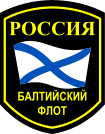
Divisions Leningrad Naval Base · Baltiysk Naval base · Separate Guards brigade of marines of the Baltic fleet · 127 separate sea engineering battalion · Strazh Balticy (newspaper)Navy bases in Kaliningrad Oblast Fleet command: Kaliningrad • Marine base: Baltiysk • Air bases: Chernyakhovsk · Kaliningrad Chkalovsk · Donskoye · KhrabrovoNavy base in Saint Petersburg and Oblast Former Naval Bases Categories:- Cities and towns in Kaliningrad Oblast
- Baltic fleet
- Kaliningrad
- Populated places established in 1946
- Russian and Soviet Navy bases
- Port cities and towns in Russia
- Germany–Soviet Union relations
- Port cities and towns of the Baltic Sea
- Populated coastal places in Russia
- German communities
Wikimedia Foundation. 2010.

